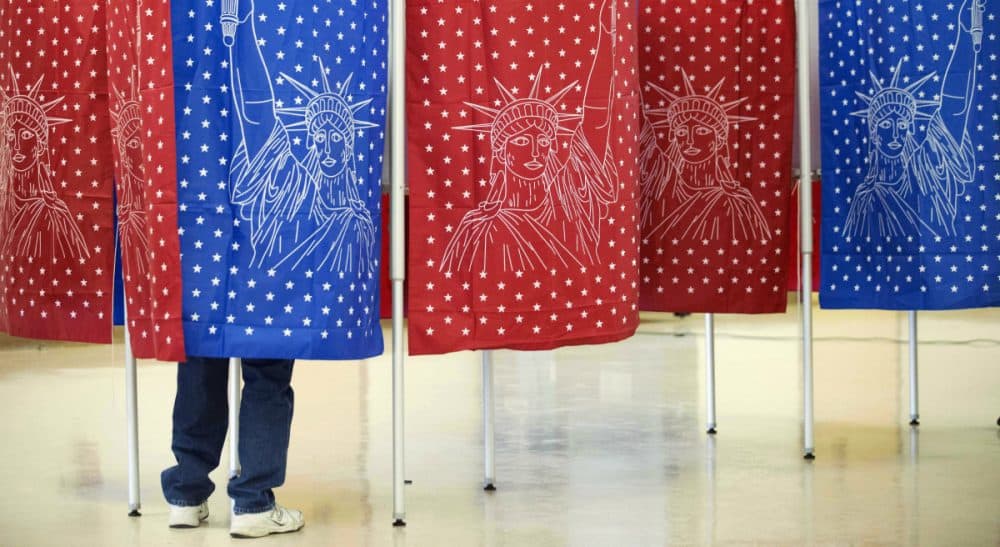Advertisement
Why New Hampshire Matters: Follow The Money

To understand the deeper significance of Tuesday night’s primary — the landslide victories won by once-longshot candidates Bernie Sanders and Donald Trump — requires a little history.
It starts (at least for our purposes) way back in 1971, when President Richard Nixon met with representatives from the Associated Milk Producers Incorporated (AMPI) in the White House Cabinet room. On the table: a deal to raise the federal subsidy for milk in exchange for a $2 million campaign contribution.
Thanks to Nixon’s secret taping system, we now know how that meeting ended: with John Ehrlichman, the president’s counsel, saying, “Well, we better get ourselves some milk before the price goes up. Let’s get it while it’s still cheap.” The response: a big group laugh.
...the only way to address the larger issues we face as a nation -- from income inequality to climate change -- is by ridding our electoral process of corporate parasites.
Several months later, the so-called Watergate scandal broke. Most people associate that scandal with a break-in engineered by Republican operatives from Nixon’s re-election campaign, which led the president to resign rather than facing impeachment. In fact, the Watergate scandal was, more broadly, about corporate influence and backroom deals. Its prosecutor eventually indicted 21 corporations, including AMPI.
The American people, and our media, were horrified at this corruption, which they rightly linked to the infusion of private money into the public election process. This outrage led Congress, with overwhelming bi-partisan support, to legislate strict limits on campaign contributions. Americans, and our electoral process, appeared to have gotten the last laugh.
Not so much. In the ensuing years, political operatives and activists (mostly Republican) have been trying to figure out how to subvert these limits, at the behest of huge corporations.
They have been wildly successful, both in establishing “political action committees” that are officially unaffiliated with campaigns, but work on their behalf, and by taking advantage of a conservative Supreme Court, whose Citizens United decision opened the floodgates to corporate money.

This has been great for the special interests (which is just political code language for “corporations and the billionaires who own and run them”) and terrible for the rest of us. It’s the reason so much of our public policy is warped toward those interests, and so much of our economy is rigged in the same way.
What Tuesday night’s results in New Hampshire suggest, at least in part, is that Americans are fed up with this arrangement. Bernie Sanders has made opposition to corporate influence in politics the central plank in his unexpectedly popular platform.
Over and over again, he has stressed that the broader aim of his candidacy is to create a grassroots political movement that will get private money out of our public elections. Because the only way to address the larger issues we face as a nation — from income inequality to climate change — is by ridding our electoral process of corporate parasites.
And, believe it or not, many of Donald Trump’s supporters are drawn to him precisely because they see in him someone who is not beholden to corporate money, who doesn’t take his marching orders from billionaires in back rooms.
Americans have finally figured out that an electoral system bought and paid for by corporations and billionaires will never reflect, or protect, the interests of working Americans.
He has called the current system of campaign financing a “disgrace” and said that he “loves” the idea of campaign finance reform. The fact that Trump also brags about how many millions of dollars he’s given to candidates in the past (and the influence this has won him) suggests that his sentiments on the matter are not exactly pure as the driven snow. But his rhetoric, at least, sets him apart from the rest of the GOP pack, who openly feast on PAC money. These are candidates all too happy to meet with their corporate minders and cut backroom deals while laughing at the American people.
Say whatever you will about both candidates, but don’t miss the larger message: Americans have finally figured out that an electoral system bought and paid for by corporations and billionaires will never reflect, or protect, the interests of working Americans.
Good on New Hampshire voters for sending that message. Let’s hope the rest of the country hears it, loud and clear.
